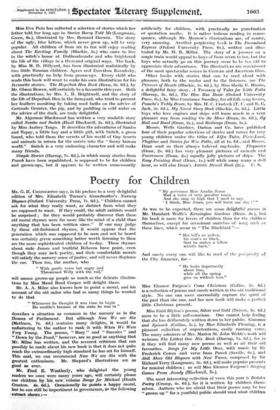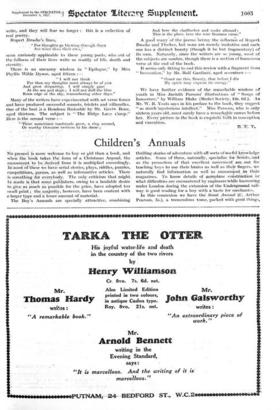Poetry for Children
Mn. G. H. CHESTERTON says, in his preface to a very delightful edition of Mrs. Elizabeth Turner's Grandmother's Nursery Rhymes (Oxford University Press, 7s. 6d.), " Children cannot ask for what they really want, as distinct from what they are supposed to want. If they could, the adult satirists would be surprised ; for they would probably discover that these old moral rhymes were far more like the mind of a child than anything that has been written since." If one may judge by these old-fashioned rhymes, it would appear that the generation which was supposed to be seen and not be heard was certainly given something better worth listening to than are the more sophisticated children of to-day. These rhymes about rude James and truthful Rebecca have point, even though they may lack poetry, and their comfortable morals will satisfy the nursery sense of justice, and will never displease the ear. Then too, the mother, who
" With gentle voice_ but angry nod Threatened Willy with the rod,"
will amuse grown-up people as much as the delicate illustra- tions by Miss Maud Reed Cooper will delight them.
Mr. A. A. Milne also knows how to point a moral, and his account of the old sailor who had so many things he wanted to do that
" Whenever he thought it was time to begin He couldn't because of the state he was in "
describes a situation as common in the nursery as in the Houses of Parliament. But although Now We are Six (Methuen, 7s. 6d.) contains many delights, it would be unflattering to the author to rank it with When We Were Very Young. The poems, " Busy " and " Sneezles " and " Down by the Pond," however, are as good as anything that Mr. Milne has written, and the severest criticism that can possibly be made about his new book is that it does not quite reach the extraordinarily high standard he has set for himself. This said, we can recommend Now We are Six with the greatest enthusiasm. Mr. Shepard's illustrations are as good as ever.
Mr. Fred E. Weatherly, who delighted the young readers we once were many years ago, will certainly please our children by his new volume Songs for Michael (Heath Cranton. 4s. &I.). Occasionally he points a happy moral, but he can still be impertinent to governesses, as the following extract shows :—
" My governess Miss Amelia Jones Had a voice of very peculiar tones, And she sang so high that I used to say, ' I think, Miss Jones, you will burst one day !' "
As was to be expected, there are some delightful poems in Mr. Humbert Wolfe's Kensington Gardens (Benn. fis.), but
his book is more for lovers of children than for the children themselves, except for occasional snatches of song such as these lines, which occur in " The Blackbird "-
" His bill's so yellow, his coat's so black, that he makes a follow whistle back."
And surely every one will like to read of the pomposity of the City financier, for-
" He looks importantly about him,
while all the spring goes on without
Miss Eleanor Farjeon'S Coins Christmas (Collins, 3s. ed.) is a collection of poems and carols written in the old traditional
style. No one can more successfully capture the spirit of the past than she can, and her new book will make a perfect little Christmas present.
Miss Enid Blyton's poems, Silver and Cold (Nelson, 3s. ed.) seem to be a little self-conscious. One cannot help feeling that she has deliberately written down to her public. Gammon and Spinach (Collins, 5s.), by Miss Elizabeth Fleming, is a pleasant collection of unpretentious, easily running verse. The many admirers of Mrs. Marion St. John Webb's work will welcome The Littlest One His Book (Harrap, 7s. 6d.), for in it they will find many new poems as well as all their old favourites. Songs for My Little Ones, with music by Sir Frederick Cowen and verse from Punch (Saville, Os.), and Still More Old Rhymes with New Tunes, composed by Sir Richard Terry (Longman, 3s. 6d.), will make popular presents for musical children ; so will Miss Eleanor Farjeon's Singing Games Prom Arcady (Blackwell, es.).
The most interesting collection of verse this year is Bedalcs Poetry (Crump, 4s. 6d.), for it is written by children them- selves. Authors who are afraid that their poems may be too " grown up " for a youthful public should read what children
write, and they will fear no longer : this is a collection of real poetry.
Rupert Brooke's lines,
"For thoughts go blowing through them Are wiser thin tlieir own,"
seem curiously applicable to these young poets, who out of the fullness of their lives write so readily of life, death and eternity.
There is an uncanny wisdom in " Epilogue," by Miss Phyllis Wilde Dyson, aged fifteen :-
" I will not think
For then my thoughts must always be of you And grow despairing. I will simply gaze
At the sea and ships ; I will not dull the blue Keen edge of the sky, remembering other days."
Many of the writers have experimented with set verse forms
and have produced.successful sonnets, triolets and villanelles. One of the best ;s a Rondeau Redouble by. Mr. Gavin Bone, aged thirteen. The subject is " The Ridge Lane Camp."
Here is the second verse ,
"There sometirneii`tiap.dstools grow, a ring around, Or worthy titmouse twitters to his dant° ;
And-here the chaffinches and rooks ablitutd: This is the place, here the wise Romans came " A good many-of the poems betray the influence of Rupert Brooke and Fleeker, but none are merely imitative and each one has a distinct beauty (though it be but fragmentary) of its own. Naturally, since the writers are so young, most of the subjects are sombre, though there is a section of humorous verse at the end of the book.
It seems only fitting to end this review with a fragment from " Invocation," by Mr. Rolf Gardinei, aged seventeen :-
" Grant me this; Beauty, that before I die My spirit may. express its energy."
We have further evidence of the remarkable wisdom of youth in Miss Jacinth Parsons' illustrations of " Songs of Innocence," by William Blake (Medici Society, 12s. 6d.). M Mr. W. B.-Yeats says in his preface to the book, they suggest " so much -mysterious intellect." Miss' Parsons, who is only sixteen, years old, Must. surely have a remarkable career before her. Every picture in the book is exquisite Oh in conception and execution.
It it 'T.











































































 Previous page
Previous page